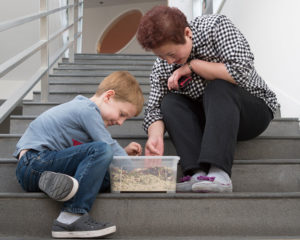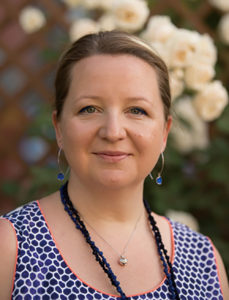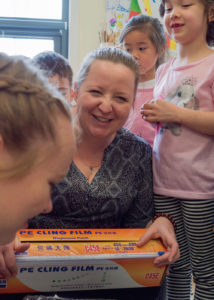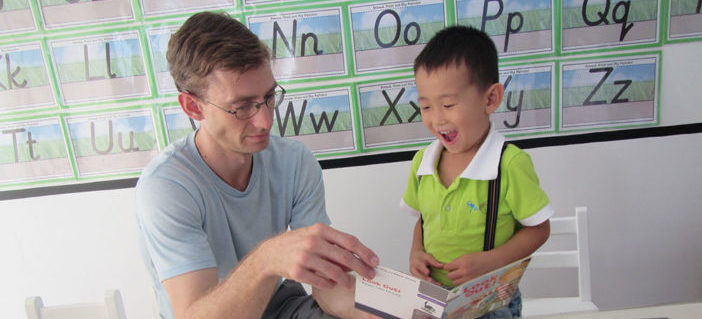Childhood, more than any other time of life, is filled with rites of passage. Every birthday marks a significant stage, and there are physical changes such as the loss of milk teeth and the onset of puberty, and social markers like the first sleepover or running an errand for the first time.
Perhaps most significant though are the transitions between educational environments. More than any change of job in adulthood, these events mark sudden and drastic changes in a child’s lifestyle, friendship groups, and the expectations placed on them.
The move from kindergarten to elementary/primary school is often the first, and in some ways the most challenging, of these educational earthquakes. What happens in those crucial months has a huge impact on the child’s later life. According to a UNICEF report, “School readiness is linked to improved academic outcomes in primary and secondary school and positive social and behavioral competencies in adulthood.” Yet all this takes place at a time when the child’s ability to understand what is happening is limited, and their world view is still being formed.
 To find out how the young minds of Beijing’s international community are prepared for this pivotal stage in their lives, we talked to educators from two very different kindergartens, about their philosophies and practices in this critical area.
To find out how the young minds of Beijing’s international community are prepared for this pivotal stage in their lives, we talked to educators from two very different kindergartens, about their philosophies and practices in this critical area.
Eduwings offers trilingual education, in German, English, and Chinese, to 165 children aged from 1-6 over two campuses, in Shunyi and Haidian. Principal Stephanie Janusch explained their underlying principles to us.
“We always say we try to give the kids ‘roots and wings’,” she told us, “a safe, home-like environment, and at the same time abilities and tools and social skills which can help them to be thinking individuals, to go out there and make a way for themselves.”
“The biggest thing kids have to deal with is being socially developed, being able to get on with peers, understand how to listen,” added Jade Sackett, Lead Teacher for the Experts Group. “Our job is to make sure they’re having fun, enjoying themselves while learning. If the communication is good, and children are comfortable, it’s easier to get them to focus.”
 3e International School has students aged from 2 to 12, and Kindergarten Principal Amy Loveday-Hu agreed that academic achievement is, at this stage, secondary to developing social skills and a passion for learning.
3e International School has students aged from 2 to 12, and Kindergarten Principal Amy Loveday-Hu agreed that academic achievement is, at this stage, secondary to developing social skills and a passion for learning.
“The focus on 21st century schools and learning for both international and Chinese families means recognizing the importance of collaboration, emotional understanding, and respect for differences,” she told us. “We teach them to question respectfully, to be able to move between different cultures. This also means different cultures of school and areas of learning. We want them to ask questions, to be passionate learners, influencing their own learning.”
Xu Hong is a kindergarten teacher at 3e who worked for twenty years in Chinese public schools, and she sees a real difference in the international school’s ethos. “The difference is that at 3e you hear kids asking why, not being annoying but inquisitive. That’s not heard a lot in local schools. The desire to learn things is really important. Teachers don’t know everything; sometimes students will learn new things at the same time as their teacher. If a decision has been made and they don’t think it’s fair, we encourage them to ask in an appropriate way why that decision was made, and have a conversation about it.”
She sees resilience as a key trait in making a successful transition.
“One of the biggest challenges is that in school they will meet disappointments, quite regularly. This is a demographic who mostly haven’t met many in their life up to that point.”
“Kindergarten is still a play-based level,” Loveday-Hu explained, “but first grade and above move away from that quite quickly. Their days become lesson-focused, their free time significantly less. In kindergarten they can naturally bounce from thing to thing, but at school the teacher is generally deciding what they’re doing. It can be a shock, quite tough for some children.”
Discipline is also a new challenge, Xu told us.
“At kindergarten there’s more flexibility for helping children to understand boundaries; at elementary school there’s an expectation of them already being on board. There’s less of a ‘buffer zone’.”
Janusch also talked about the social aspects of transition as being critical.
“One of the biggest challenges,” she said, “is the move from a small, familiar, family-like environment to a bigger class, more students, a lower teacher-student ratio, and usually less individual care being given. They’ll have a new peer group, new friends, new teachers. Some of our students came to us when they were still really babies: aged 1, or 18 months. By the time of the transition to primary they have been with their friends for four years.”
The work of preparing for transition does not just take place in the final year, Loveday-Hu said.
“It begins right from when they come into school. Even nursery is part of the process. Throughout school we’re scaffolding the children’s understanding.”
Janusch talked about the importance of developing good habits early.
“We have routine activities every day, themed activities where all the kids sit in one classroom and do an activity together, so they already have the habit of sitting down, focusing on an activity.”
“They do activities to gain early literacy skills,” she continued, “and work on phonics, easy maths concepts, and small maths operations. But the groundstone for that is already set, because even in the younger age groups, at 2.5 to 3.5, in a playful way we raise their phonic awareness, introduce concepts like nouns and numbers, so that by the time they reach preschool, they have already formed the ideas in their head. It’s not so much about academic knowledge, more about making kids ready for school.”
“Some kids enter 1st grade without having learned anything apart from writing their name maybe, but the most important thing is that kids are self-confident, feel they can do things on their own without being scared of making mistakes,” Sackett said. “We give them a safe environment where they can try things out, make experiences, be independent. We start that at the youngest age group. They learn that there are different languages, different ways to pronounce words. The kids have fun without learning pressure, and get introduced to daily routines.”
At 3e preparation for transition begins in earnest in the second semester.
 “Round about April or May,” Loveday-Hu said, “we have a child-led conference, where the children demonstrate to the parents what they’ve learned. Then we start to talk in earnest about what happens next. We do it with all age groups, but for older children it might mean writing homework about the next step, what might happen, what they’re anxious about.”
“Round about April or May,” Loveday-Hu said, “we have a child-led conference, where the children demonstrate to the parents what they’ve learned. Then we start to talk in earnest about what happens next. We do it with all age groups, but for older children it might mean writing homework about the next step, what might happen, what they’re anxious about.”
However she emphasizes that kindergarten has its own value, and is not merely about preparing for school.
“It’s important for the preparation to be the long term responsibility of the teacher, and that there’s no pressure on children. Each stage is valuable in its own right. We’re developing them as kindergarteners but also having a conversation about what happens next.”
This conversation includes being introduced to their new environment.
“We have a Transition Day,” Loveday-Hu said, “where we split the children into two groups. Those who are staying, we take them to the new campus, and give them an opportunity to discuss, and ask questions.
“We try to have them involved in a way that suits them. The kindergarten children want to touch everything, to find out what every button does, where every door goes, and you have to open it and show them. I took them to the running track, and we had a race, because that’s what it’s for. When we came to the astroturf, they were lying down on it. That’s how children at that age experience things, very directly.
“For those who are not staying, we had their teachers talk to them, give them a chance to ask questions too without feeling left out.”
Eduwings also arrange classroom visits, Janusch said.
“Usually in Spring we take the children to the schools which they might go to, while the parents are still deciding.”
“We try to arrange it so that they can sit down with students and participate in activities,” Sackett added, “so they can really get the feel of being in a 1st grade class.”
Children from Eduwings move on to a variety of different settings. Many 3e students, on the other hand, will stay on there for 1st grade, though not all, as Loveday-Hu told us.
“It depends on the parents’ path. We have a mixture: some families who know they’re going to stay on in China, and for them English and Chinese will both be important. They’ll often stay at 3e because we teach 50:50 in both languages. Families who know that they’re going back home will often choose to go to an international school which supports an easier transition to the home country. Sometimes one more year of Chinese isn’t the best thing for them. Respecting what is happening next in families’ lives is important; it’s not all about the bottom line.”
Whether students are staying or moving on, their new teachers are given extensive information about their progress at kindergarten.
“If they’re moving internally,” Loveday-Hu said, “we have a detailed portfolio system, which includes not only report cards, but work samples, and individualized plans. If children choose to leave us that goes with them, and their new teachers will see a really good set of examples from all areas of the school day. We give our contact details, so teachers can always call us, but they already have access to a lot of information.”
Perhaps because many of the students will be staying with their current peer group, graduation from 3e’s kindergarten is relatively low key.
“We don’t tend to do a formal ceremony, but we do small things,” Loveday-Hu told us. “The students get work that’s not in their portfolio, they take their family pictures home, and get a yearbook, with pictures of everything that’s happened during the year. They get a different backpack for the next school year, which acknowledges they’re moving to a different stage in their lives.
“On the last day we have a sports day, but it’s quite informal. It’s not competitive, because we have children aged from 2 to 12! The idea is that their parents come and pick them up, and we collectively engage in sports outside and just have a good time as we close this year and move onto next one.”
At Eduwings, on the other hand, the end of students’ time there is marked with traditions which reflect both the school’s German heritage and its international setting.
“We have an end of year party and performance, where the children moving on have a graduation ceremony. They also do traditional German cone-making.”
(Schultüten – literally “school bags” – have been popular throughout the German-speaking world since the early nineteenth century. They’re cones made of paper or card and filled with things to help the child start at their new school. In the past this usually meant candies, but these days the emphasis is more on stationery, pens, books and so on.)
“At the summer party the parents and kids watch the children perform and we always end with oldest kids. The teachers will say some nice words about the students who are leaving. In another tradition, each class says their goodbyes to students with a small party in the classroom. The kids also have a small goodbye present for each other. For example, one class made a shirt for each child, on which they all put their fingerprints with paint, and wrote their names. Another group made a recipe book with hand drawn pictures of the children. Different years have different gifts, but they’re all special.”
All the educators agreed that ultimately, the skills which will enable children to thrive at school are the same which will enable them to succeed in life.
“The main goal is to get them socially developed, comfortable learning, getting on with their peers, and ready for a new environment,” Sackett told us.
For Loveday-Hu allowing each child to develop at their own pace is critical:
“There’s no competition. Do your best and be the best you can be is all we expect, then you can confidently move through the system.”
Photos: Courtesy of Eduwings and 3e





